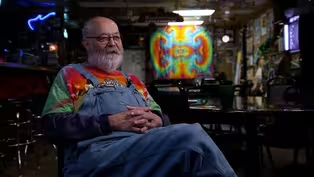
Puppy Jake
Clip: Season 1 Episode 108 | 6m 41sVideo has Closed Captions
Service dogs can be trained to support a person in a number of meaningful ways.
Service dogs can be trained to support a person in a number of meaningful ways. The Puppy Jake Foundation trains and provides service dogs to assist disabled military veterans.
Problems playing video? | Closed Captioning Feedback
Problems playing video? | Closed Captioning Feedback
Iowa Life is a local public television program presented by Iowa PBS

Puppy Jake
Clip: Season 1 Episode 108 | 6m 41sVideo has Closed Captions
Service dogs can be trained to support a person in a number of meaningful ways. The Puppy Jake Foundation trains and provides service dogs to assist disabled military veterans.
Problems playing video? | Closed Captioning Feedback
How to Watch Iowa Life
Iowa Life is available to stream on pbs.org and the free PBS App, available on iPhone, Apple TV, Android TV, Android smartphones, Amazon Fire TV, Amazon Fire Tablet, Roku, Samsung Smart TV, and Vizio.
Providing Support for PBS.org
Learn Moreabout PBS online sponsorshipWelcome back.
My name is Tabitha.
So, we'll be going over the public access skills today here at Puppy Jake and we are going to go out in public today.
For right now we're just kind of building relationships, having the dogs learn how to work with us.
♪♪ Lisa Russell: A service dog is a dog that can provide specific tasks.
The type of dogs that we do here at Puppy Jake are very specific to PTSD and mobility.
Any veteran who has been discharged from the military with some sort of disability is eligible for a Puppy Jake dog.
♪♪ Lisa Russell: We have right now 28 dogs that we are training for veterans.
We have six that come in about every quarter.
And we have about 40 veterans that are actively out there with their service dog.
(race car engines) ♪♪ ♪♪ Lisa Russell: We're at the Indy Car races.
♪♪ Lisa Russell: So, one of the reasons that we bring dogs to the event is that it gives us an opportunity to train them in an environment and what we call public access, so that ultimately what we want our service dogs to be able to do is to go out with their veteran in an environment like this.
Why we bring them out also is because everybody loves puppies and that gives us a chance to tell more people about what we're doing and how we do it and how we need help.
Kernel, between.
Zac Fox: So, my name is Zac Fox and my dog Kernel.
Lindsay Fox: With rescue, we fostered probably 75 dogs or so, but it can be really hard on you.
So, we decided to take a break from rescue.
That lasted about two weeks.
It's really important to our family to give back to the community.
So, we decided to start with the Puppy Jake Foundation.
We started training dogs to be service dogs for our wounded warriors.
And I am the wife to a veteran that has received a placed dog.
Zac Fox: My time in service is about I'd say nine or ten years.
I learned a lot about, I don't know, I always say that PTSD is realizing that you'll never be that cool ever again in the eyes of your peers because when you do go overseas there is that feeling of you are in control.
I would not wish combat on anyone.
But it is definitely an awe-inspiring experience.
But coming back from that and realizing what happened and how close things were, that's what really makes you think, maybe I need to choose a different line of work.
And I didn't really realize that I had an issue until I met my wife and she was very understanding and was able to say hey, you might need to get some help.
So, my wife and I decided to, we wanted to give back.
We needed to do something with dogs.
So, one day she said, how about the Puppy Jake Foundation?
As a veteran, I could think of no better way to give back and I love dogs.
I said, no puppies.
And within two days we had a puppy.
♪♪ Zac Fox: And that puppy was Kernel.
And -- ♪♪ Lindsay Fox: So, currently with the Puppy Jake Foundation, the longest that you would really have a dog as a foster would be six to eight months.
But when we got Kernel it was the very beginning of the pandemic and things were wild.
So, of course we didn't want to be passing dogs from house to house.
So, we ended up keeping Kernel for the full two and a half years before he was placed.
♪♪ Zac Fox: We were still going to give him up.
We were still going to make sure that he went to the right veteran.
And it just so happened that during the training process my wife, my friends, my therapist, the VA counselors are like, what can you attribute your success to?
You're improving.
You're getting better.
You're coming off of medications.
You're happier.
The common denominator was Kernel.
And so, I applied and he is amazing.
♪♪ Zac Fox: I mean, it changes your life, it really does.
♪♪ Lisa Russell: So, Puppy Jake is a non-profit and so we exist through volunteers and donations.
And it takes two years and $25,000 and countless, countless hours of volunteers to train a dog.
♪♪ When I'm asked about what a dog does for a veteran, I often start with the story of my dad.
And that is my dad was a Vietnam War veteran, he stepped on a land mine and spent about a year of his life in a hospital.
But it was always fascinating because my mom was the one that fed the dogs, who walked the dogs, who loved the dogs and the family dogs loved my dad best.
You could watch the dogs, now in hindsight, leaning against his leg or coming in and doing this deep pressure therapy, climbing and putting themselves over his legs with no training.
And I think that that's the thing I've seen repeated is how much these veterans connect to their dogs.
And the fact that we are able to help facilitate some type of comfort, some type of assistance, if it's just the mobility issue, it just fills your heart with gratitude that you can be a part of this.
Lindsay Fox: So, service dogs are a really great tool for helping someone with a disability, but they are not an end all be all.
They are -- we always say that disability, specifically mental health disabilities, are like a wheel and all of the different support systems are various spokes on the wheel.
So, service dogs can be one spoke, but they're not going to solve everybody's problems.
Zac Fox: A lot of the guys will struggle with they feel like they're taking.
♪♪ Zac Fox: But in essence they've given so much.
If the things that you have given your country cause you to not be able to leave your house, whether you're being compensated by the VA or not with that, those are the people we're after.
Those are the people who say hey, I know for a fact I can change your life.
There's so many of these things that I can see, I can pinpoint in people, like this guy needs it now.
I mean, I sob every single time because I'm like, you have no idea how much your life is going to change.
♪♪
Video has Closed Captions
Clip: S1 Ep108 | 5m 10s | Byron's Bar in Pomeroy has become a sort of mecca for music lovers and musicians. (5m 10s)
Video has Closed Captions
Clip: S1 Ep108 | 3m 26s | Learn how this small town in Woodbury County got its name. (3m 26s)
Video has Closed Captions
Clip: S1 Ep108 | 7m 42s | One Iowan is using her platform in the STEM field to inspire next generation scientists. (7m 42s)
Providing Support for PBS.org
Learn Moreabout PBS online sponsorshipSupport for PBS provided by:
Iowa Life is a local public television program presented by Iowa PBS
















